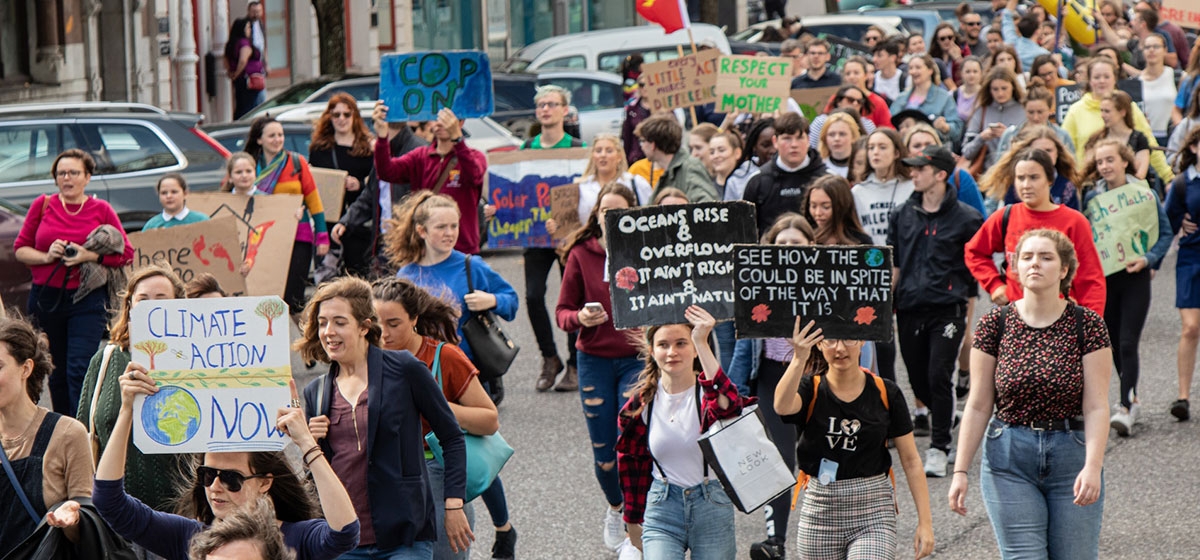Why the Extremes Are Gaining

“The best lack all conviction, while the worst / Are full of passionate intensity.” —“The Second Coming” by W. B. Yeats
Homo sapiens have lived on the earth for, let’s say, 350,000 years (since we separated from homo erectus). For 349,800 of those years, humans were desperately poor, diseased and ignorant.
In the last 200 years, coincident with the rise and eventual dominance of democracy and capitalism, those ideas have, in the words of the founder of Whole Foods Market, “transformed the face of the planet and the complexion of daily life for the vast majority of people.”
Just in the last seven decades—since the end of the last world war—people have become, as Steven Pinker puts it, “longer-lived, healthier, safer, richer, freer, fairer, happier and smarter, not just in the west but worldwide.”
Finally, by any objective standard, the first two decades of the twenty-first century have probably been the best time to be alive in all of human history. As Johan Norberg recently pointed out, “The 2010s have been the best decade ever.”
More than half the world’s population is now middle class, an astounding accomplishment. There are no major wars anywhere, and deaths by violence are at the lowest levels ever seen—or imagined.
And yet, the very free market democracies that drove this remarkable progress in human affairs are falling apart before our eyes, as I’ve spent the last four posts in this series demonstrating. We are collapsing under the onslaught of people who are “full of passionate intensity” and amidst the abdication of the rest of us, who “lack all conviction.”
If things are so good, at least relative to the long experience of human misery that has characterized our species, why are so many people so angry, so willing to tear down the societies and economies that have served us so well? Why are they so “full of passionate intensity?” Here are a couple of my own guesses.
The world was fundamentally changed by the Global Financial Crisis. When William Butler Yeats wrote his poem, “The Second Coming” (quoted above), the year was 1919. The horrific Great War had just ended, and the world was completely at sea. Everything that had held societies together since the Renaissance seemed to have been torn apart by the terrible experience of the war, and nothing was available to replace it.
The terrifying ending of Yeats’ poem includes two of the most famous lines in English poetry: “And what rough beast, its hour come round at last, / Slouches toward Bethlehem to be born?”
It turned out that Yeats was not only right, but way too optimistic. In the post-Great War chaos, there wasn’t just one “rough beast” about to be born, but a whole bunch of them: Vladimir Lenin and Joseph Stalin, the Great Depression, Hitler and the Nazis, World War II.
As Yeats had suggested, a world that had formerly imagined itself making ever more progress and becoming ever better had been suddenly tossed into nightmarish chaos by the Great War and its awful aftermath.
Is it possible that we are about to relive a Yeats-like nightmare of our own? Is the extraordinary progress the human species has made over the past two centuries merely illusory? Is that why people are so angry?
We haven’t experienced anything like the Great War, of course, but we did experience an economic version of it—the Global Financial Crisis.
From a purely factual point of view, of course, the GFC was nothing like as devastating as the Great War. Nobody died, and today the world’s economies and stock markets have all fully recovered and are stronger than ever.
But if you were a young person just entering adulthood in 2008, or if you were already deeply skeptical of free markets and of representative democracy, the GFC might well have put you over the edge.
The crisis, predicted by no one and coming upon us very suddenly, seemingly out of nowhere, was a shock. To many it suggested that the world was nothing like as stable and certain as we had thought it was, that societies were far more unfair to the poor and weak, and therefore, our existing societies and economies needed to be torn down and reconstructed along other lines.
For those of us who have been alive for all or parts of nine decades, this sort of thinking seems positively sophomoric. But maybe we’re too old to understand.
The world has been fundamentally changed by global warming. I’ve written about this elsewhere, when I likened climate panic (as opposed to thoughtful discussions of climate change) to a religion rather than a science. But the reality is that nobody knows how bad—or not bad—climate change is going to be. There will be winners and losers, to be sure, but how will it all net out?
Many people, especially in the media and the universities, believe global warming represents an existential threat to life on earth and that no amount of social and economic disruption, no amount of money spent, is too much because we would literally be saving the world.
Since the earth’s climate has been changing as long as there has been a climate, and since humans have survived—and even prospered—for 350,000 years of climate change, the panic over warming seems way overdone. But maybe it isn’t.
As for why “the best lack all conviction,” there are some obvious reasons but also many mysteries. Maybe we don’t push back against the passionate ones’ worst nonsense because we fear we would be targeted next. Maybe it’s because we so agree with their goals we are willing to overlook their cruel methods. Or perhaps it’s because we, too, want a better world and have forgotten that the perfect is the enemy of the good.
Whatever the reasons for our silence, it represents a serious moral failing. By not pushing back we have become complicit in the destruction of our own remarkable-but-collapsing civil societies.





